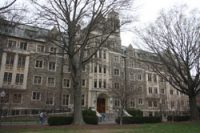On Jan. 26, the Georgetown Lecture Fund hosted Derek Black, godson of former KKK Grand Wizard David Duke, for a discussion in Copley Formal Lounge to examine his experience growing up in and eventually renouncing white nationalism.
Black grew up in the white nationalist movement as the son of Don Block, founder of the white nationalist website and forum, Stormfront. His story of leaving the movement became public in a New York Times Op-Ed and later, a Washington Post article. Black came to Georgetown in an event supported by the Students of Color Alliance, Jewish Student Association, The Hoya, Leaders in Education and Diversity, and the Black Student Alliance.
Copley Formal Lounge was filled to standing room only as Rabbi Rachel Gartner first addressed the crowd, discussing the importance of the event to show the ability for individuals to change perspectives that may originally appear fixed.
“I was amazed once again that when the common good is the goal, this incredible power comes from somewhere that allows us to pivot towards it,” Gartner said.
Marcia Chatelain, associate professor of history and African American studies, moderated the conversation as Black discussed the importance of conversation and friendship in his decision to defect from white nationalism. Black recalled how an Orthodox Jewish friend invited him to Shabbat dinners after Black’s family history and activities were published on a school forum at the New College of Florida. His new friends slowly pulled apart Derek’s belief system with compassion and scientific evidence that contradicted his white supremacist beliefs.
“It’s not just the article[s they gave me], it’s the fact that someone I knew and trusted thought I was wrong… it’s this whole emotional backdrop,” Black said.
Aiden Johnson (COL ‘19), chief of staff of the Lecture Fund, first heard Derek Black’s story in an article a friend sent him. “Within sixty seconds the first things I did were, I sent it to another one of my friends and I said ‘I want to bring this guy to come lecture at Georgetown,’” Johnson said.
D.J. Angelini (MSB ‘17), chair of the Lecture Fund, said that Black’s lecture aligned with with the group’s purpose. “Our mission is always to empower learning through dialogue and that really ties into this event because it’s a really interesting event and it’s something that we might not traditionally read about [or explore] in our classes,” Angelini said.
Black and Chatelain discussed the importance of Black’s experience in the light of the country’s current political climate at length. “There are a lot of people talking right now about this election and white nationalism and how the alt-right figures into that, and Derek…has the unique perspective of having been a part of it at one point and knowing people who are involved in some of these things that are bubbling up right now,” Johnson said.
Angelini agreed with Johnson that Chatelain’s moderation helped Black and students examine delicate issues relevant to current events. He said that having Chatelain moderate the discussion made it more accessible.
Black also discussed the prevalence of racist and xenophobic rhetoric in the recent election cycle racist and xenophobic rhetoric in the recent election cycle, citing it as a major motivating force for the alt-right in America. “The difference between white nationalist and political discourse is that they don’t say ‘white,’” Black said. His remark was greeted with applause from the audience.
Johnson believed that Georgetown students received such speeches well and are engaged and excited. Elizabeth Cylkowski (SFS ’18), said that she felt she had a new understanding of the issues.
“It was one of the most powerful events I’ve been to,” said Cylkowski. “I’m speechless.”
Johnson and Angelini hope that students will use this event as a jumping-off point to encourage future conversations about race.
“The real point that we shoot for is having the conversation that happens in the lecture hall or the classroom or whatever continue when people go to Harbin or Leo’s—they keep talking about it, and they keep engaging with these ideas,” Johnson said.
Black was also proud to be able to inspire these conversations, and he said he felt a sense of relief at no longer being a part of the movement that took up so much of his childhood and that he was glad to no longer have to keep his beliefs a secret. “I think I trust people more now than I used to because I no longer have to wait for the break. When I make a friend now, I don’t have to worry that they’ll discover me and lean over,” said Black. “I’m much more open now.”





